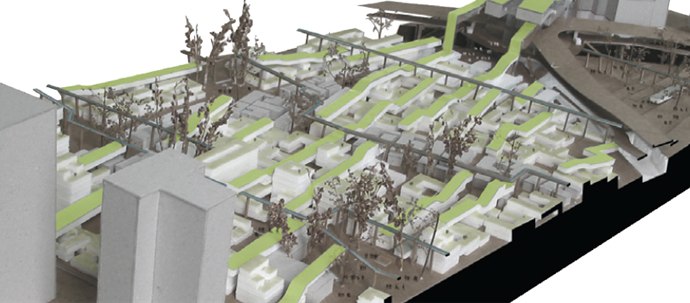
Cross-section of a proposed urban village with rooftop agriculture and transit oriented development. (Illustration courtesy of Beijing Urban Design Studio.)
Featured Courses
The Department of Urban Studies and Planning (DUSP) is a department within the School of Architecture and Planning at MIT.
It is comprised of four specialization areas (also referred to as Program Groups): City Design and Development; Environmental Policy and Planning; Housing, Community and Economic Development; and the International Development Group. There are also three cross-cutting areas of study: Transportation Planning and Policy, Urban Information Systems (UIS) and Regional Planning.
Since its inception in 1933, the Department of Urban Studies and Planning has consistently remained one of the top planning schools in the country. Now totaling close to 60 teaching faculty members (more than half of whom are full-time tenured and tenure-track faculty), it has the largest planning faculty in the United States.
The Department is organized around the following core questions of engagement and progressive change: "Can we make a difference in the world? Can we design better cities? Can we help places grow more sustainably? Can we help communities thrive? Can we help advance equitable world development?" Our mission statement is as follows:
We are committed to positive social change. Our moral vision is translated into professional education in distinct ways:
- We believe in the abilities of urban and regional institutions to steadily improve the quality of life of citizens.
- We emphasize democratic decision-making involving both public and private actors, and acknowledge the necessity of government leadership to ensure greater social and economic equality.
- We foster a positive approach to technological innovation as a major force of social change.
- We trust that the built environment can meet the needs of diverse populations and serve as a source of meaning in their daily lives.
In addition to the Urban Studies and Planning courses listed below, see also OCW’s Supplemental Resources associated with the department.
Urban Studies and Planning Courses
-
- Course #
- Course Title
- Level
Archived Urban Studies and Planning Courses
Some prior versions of courses listed above have been archived in OCW's DSpace@MIT repository for long-term access and preservation. Links to archived prior versions of a course may be found on that course's "Other Versions" tab.
Additionally, the Archived Urban Studies and Planning Courses page has links to every archived course from this department.










